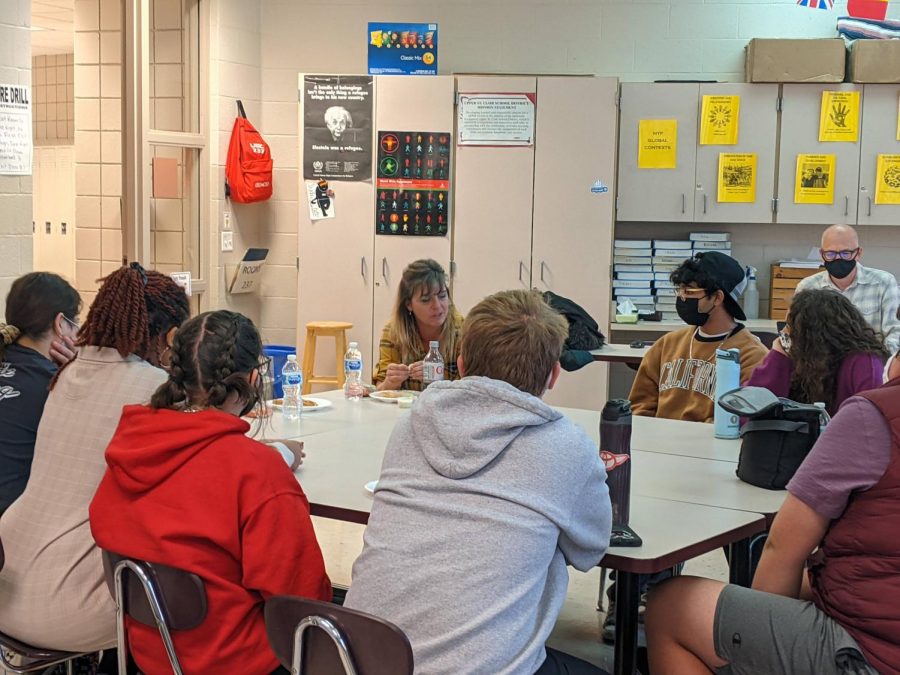Former White Supremacist Visits Upper St. Clair High School
Discusses Hate and Extremism
December 14, 2021
On November 12th, Shannon Foley Martinez, a former violent white supremacist, visited Upper St. Clair High School and gave a talk during blocks seven and eight on her experiences, her current mission in life, and her views on the development of hate and extremism. Foley Martinez, who grew up primarily in rural Michigan, shared her familial experiences as well as her struggle with sexual assault, both of which contributed heavily to her ultimate turn to violence. She recounted that growing up, there was very little tolerance for expressing one’s emotions to an elevated degree, and there was frequent pushback when vulnerabilities such as illness were expressed.
In addition to feeling emotionally restricted in her own household, Foley Martinez was also sexually assaulted as a young teenager. Living in a relatively isolated area, being deprived from playing sports, which had been a primary aspect of her life for as long as she could remember, and residing in an incredibly emotionally-stunted environment, Foley Martinez was left with no one in which she could confide. Rather than having the opportunity to healthily address her feelings, she was forced to bury any trauma caused by the incident deep inside herself; a consequence that would manifest itself in extremism and violence until Martinez reached her twenties.
Martinez spent the majority of her young adult life traveling to different parts of the country, living with other white supremacists, and encouraging and participating in violence associated with, what was known at the time, as the “White Power” movement. She continued to seek out violence and extremism, at everywhere from punk rock concerts to clubs, until she spent time living with her (at the time) boyfriend’s family. Her partner had two younger brothers, with whom she spent a great deal of time, and she soon realized that she did not wish those children to be exposed to the “White Power” movement in any capacity. After considering the fact that she allegedly supported certain beliefs, and yet wished that young children were not exposed to them, she realized that the path she had chosen was one that she did not truly support.
Since Foley Martinez’s re-entrance into society, she has spent her time mentoring individuals both inside and transitioning from that lifestyle, traveling across the country to give speeches on hate and extremism, and speaking on national television outlets throughout the U.S. She considers it her duty to speak about her experiences until her “last dying breath,” and was actually speaking at Upper St. Clair High School on her youngest child’s birthday, demonstrating her commitment to the cause. Foley Martinez is specifically able to speak to schools through an organization called Classrooms without Borders, which works to teach history through experience by traveling with students to historical sites and sharing the stories behind those places while students are there. Since traveling itself has become more difficult in light of the pandemic, Classrooms without Borders not only hosts similar speaking events but conducts virtual historical experiences as well.
While Classrooms without Borders coordinates Foley Martinez’s classroom-speaking engagements, Mr. Moore and other sponsors and members of USC’s Black Student Union helped to coordinate Foley Martinez’s visit to the high school. Students of all classes and organizations were welcome to attend Foley Martinez’s talk during blocks seven and eight, but BSU members specifically were given the opportunity to have lunch with Shannon Foley Martinez and ask her any questions they had leading up to the event. During the actual event, Martinez not only recounted her experiences but also her views on the acceleration of violence and extremism. She asserted her belief that no form of hate is truly ideologically-driven, but rather that ideologically-based hate is a cover for a coping mechanism for some sort of trauma or other psychological issues. Addressing the current extremist and divisive climate of the US, as was mentioned in several student-posed questions, Foley Martinez cited social media as a driving force in connecting extremists and providing platforms for hateful speech and action.
Shannon Foley Martinez provided an invaluable perspective on the inside of a movement that has not only grown in recent years, according to Martinez herself but has also seriously harmed the country on an individual and national level. She further elaborated on national division, referencing the tactics extremists use to sow division and how easily extremist ideals can be integrated into society. However, despite extensive discussion on violence, extremism, and the generally unstable domestic state of the US, Foley Martinez did not seem pessimistic. She emphasized that to succeed, we need to “weaponize hope,” and work to find unity within ourselves: “the antidote to hate is not love, but connection.”
